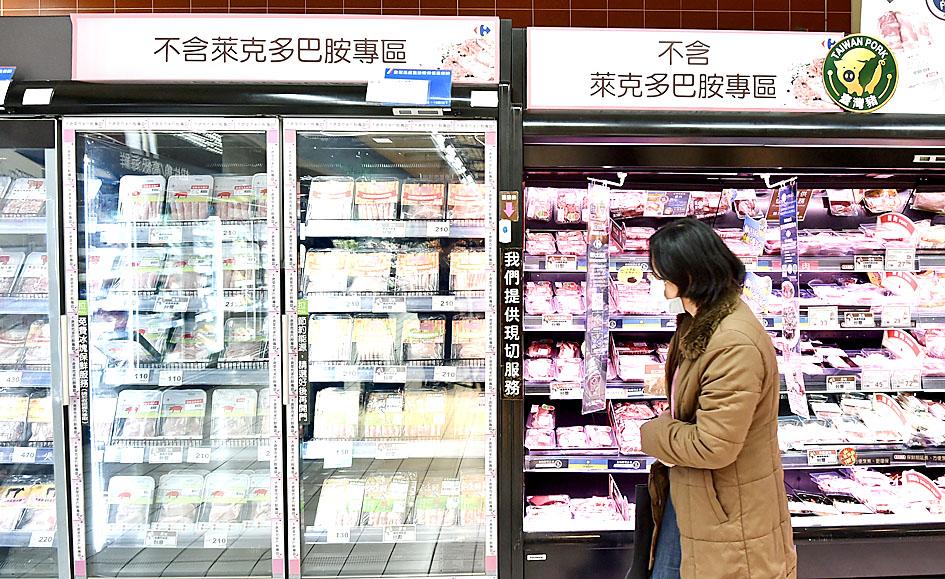President Tsai Ing-wen (蔡英文) yesterday in her New Year’s Day speech asked Taiwanese for understanding over the government’s decision to open up to imports of US pork containing traces of ractopamine.
Although the animal feed additive is banned for use in pigs in Taiwan, because of concerns over its safety to animals and humans, lawmakers on Thursday last week approved administrative directives related to the government’s decision to lift restrictions on the import of US pork containing traces of ractopamine and US beef from cattle older than 30 months.
The changes, effective yesterday, are widely viewed as an effort by the government to satisfy US prerequisites for negotiations on a bilateral trade agreement.

Photo: Tu Chien-jung, Taipei Times
Tsai said that Taiwan “depends on trade to survive” and had resolved to move forward on a policy that had been “left pending by three successive administrations.”
“With utmost humility, I ask my fellow citizens for your understanding and hope everyone knows that we thought long and hard before we made this decision,” she said.
Tsai defended the policy not only in terms of trade, but also geopolitics.
In response, Taipei Mayor Ko Wen-je (柯文哲) said that the government did not consult the public or opposition parties before announcing the lifting of the ban, and gave local governments just seven days to prepare for the new regulations.
The Executive Yuan’s announcement on Thursday that it was nullifying local government ordinances banning meat products containing traces of ractopamine was “calculated, conspiratorial and without humility,” Ko said.
“The people are watching. It does not matter what you say, it is what you do,” he said.
Ko was speaking during a visit to a “ractopamine-free pork” section of a Carrefour hypermarket, which was established after the Taipei City Government passed ordinances requiring importers to test pork for the substance and stores to label pork products.
Carrefour, RT-Mart, Costco and Breeze are among 11 retailer chains operating in the city that have set up “ractopamine-free pork” sections in their stores, the Taipei Department of Health said.
Officials are to increase a random inspections program at food courts, street food vendors and markets, the department said, adding that false labeling would result in a fine of up to NT$4 million (US$140,311) under the Act Governing Food Safety and Sanitation (食品安全衛生管理法).
New Taipei City Mayor Hou You-yi (侯友宜) yesterday visited a “ractopamine-free cuisine” section of the Global Mall at Banciao Railway Station.
New Taipei City last month announced ordinances mandating ractopamine labels for nine types of vendors and the regulations would be implemented in stages, Hou said.
In the first stage, the rules apply to Western fast-food franchises, restaurants and caterers serving 20 tables or more, supermarkets serving prepared food or beverages prepared on site and bakery franchises, he said.
In the second half of the year, the city expects to broaden the regulations to include food courts at hospitals, breakfast chains, convenience stores and hypermarkets serving prepared food or beverages prepared on site, and department store food courts, he said.
“It is a done deal that pork imports containing ractopamine is allowed, but I beseech the president to tell the Executive Yuan to mandate that pork products with ractopamine should be labeled, so that the public’s right to know is protected,” Hou said.

Taiwan is stepping up plans to create self-sufficient supply chains for combat drones and increase foreign orders from the US to counter China’s numerical superiority, a defense official said on Saturday. Commenting on condition of anonymity, the official said the nation’s armed forces are in agreement with US Admiral Samuel Paparo’s assessment that Taiwan’s military must be prepared to turn the nation’s waters into a “hellscape” for the Chinese People’s Liberation Army (PLA). Paparo, the commander of the US Indo-Pacific Command, reiterated the concept during a Congressional hearing in Washington on Wednesday. He first coined the term in a security conference last

Prosecutors today declined to say who was questioned regarding alleged forgery on petitions to recall Democratic Progressive Party (DPP) legislators, after Chinese-language media earlier reported that members of the Chinese Nationalist Party (KMT) Youth League were brought in for questioning. The Ministry of Justice Investigation Bureau confirmed that two people had been questioned, but did not disclose any further information about the ongoing investigation. KMT Youth League members Lee Hsiao-liang (李孝亮) and Liu Szu-yin (劉思吟) — who are leading the effort to recall DPP caucus chief executive Rosalia Wu (吳思瑤) and Legislator Wu Pei-yi (吳沛憶) — both posted on Facebook saying: “I

The Ministry of Economic Affairs has fined Taobao NT$1.2 million (US$36,912) for advertisements that exceed its approved business scope, requiring the Chinese e-commerce platform to make corrections in the first half of this year or its license may be revoked. Lawmakers have called for stricter enforcement of Chinese e-commerce platforms and measures to prevent China from laundering its goods through Taiwan in response to US President Donald Trump’s heavy tariffs on China. The Legislative Yuan’s Finance Committee met today to discuss policies to prevent China from dumping goods in Taiwan, inviting government agencies to report. Democratic Progressive Party Legislator Kuo Kuo-wen (郭國文) said

Sung Chien-liang (宋建樑), who led efforts to recall Democratic Progressive Party (DPP) Legislator Lee Kun-cheng (李坤城), was released on bail of NT$80,000 today amid outcry over his decision to wear a Nazi armband to questioning the night before. Sung arrived at the New Taipei District Prosecutors’ Office for questioning in a recall petition forgery case last night wearing a red armband bearing a swastika, carrying a copy of Adolf Hitler’s Mein Kampf and giving a Nazi salute. Sung left the building at 1:15am without the armband and covering the book with his coat. Lee said today that this is a serious